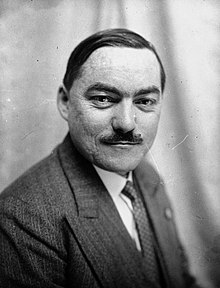Marcel Deat
| Marcel Déat | |
|---|---|
 |
|
| Minister of Air | |
|
In office 24 January 1936 – 4 June 1936 |
|
| Prime Minister | Albert Sarraut |
| Preceded by | Victor Denain |
| Succeeded by | Pierre Cot |
| Member of the French Chamber of Deputies | |
|
In office 1939 – 10 July 1940 |
|
| Constituency | Charente |
|
In office 9 May 1932 – 3 May 1936 |
|
| Constituency | Seine |
|
In office 1926 – 29 April 1928 |
|
| Constituency | Marne |
| Personal details | |
| Born |
7 March 1894 Guérigny, France |
| Died | 5 January 1955 (aged 60) Turin, Italy |
| Political party |
French Section of the Workers' International (1914–1933) Socialist Party of France (1933–1935) Socialist Republican Union (1935–1940) National Popular Rally (1941–1944) |
| Spouse(s) | Hélène Delaveau (m. 1924; his death 1955) |
| Education | École Normale Supérieure |
| Profession | Journalist, writer |
| Religion | Roman Catholicism |
Marcel Déat (7 March 1894 – 5 January 1955) was a French socialist politician until 1933, when he initiated a spin-off from the French Section of the Workers' International (SFIO) along with other right-wing 'Neosocialists'. During the occupation of France by Nazi Germany, he founded the collaborationist National Popular Rally (RNP). In 1944, he became Minister of Labour and National Solidarity in Pierre Laval's government in Vichy, before escaping to the Sigmaringen enclave along with Vichy officials after the Allied landings in Normandy. Condemned in absentia for collaborationism, he died while still in hiding in Italy.
Marcel Déat was raised in a modest environment, which shared republican and patriotic values. After brilliant studies, he entered in 1914 the École Normale Supérieure (ENS) after having been the student of Alain, a philosopher who was active in the Radical Party and who would write a deeply anti-militarist book after World War I. The same year, Déat joined the SFIO.
While he attended the ENS and worked to get a philosophy degree, World War I broke out. He joined the French Army as a private and saw active duty, winning the Légion d'honneur and five bravery citations. By the war's end, Déat had achieved the rank of captain. Under the pseudonym of Taëd, he then published Cadavres et maximes, philosophie d'un revenant (approximately translated by "Corpses and Maxims, Philosophy of a Ghost"), in which he expressed his horror of trenches, strong pacifist views, as well as his fascination for collective discipline and war camaraderie. When the war ended in 1918, he finished his studies at the École Normale and passed his agrégation of philosophy, and oriented himself towards sociology under the direction of Célestin Bouglé, a friend of Alain and also member of the Radical Party. In the meanwhile, Déat taught philosophy in Reims.
...
Wikipedia
